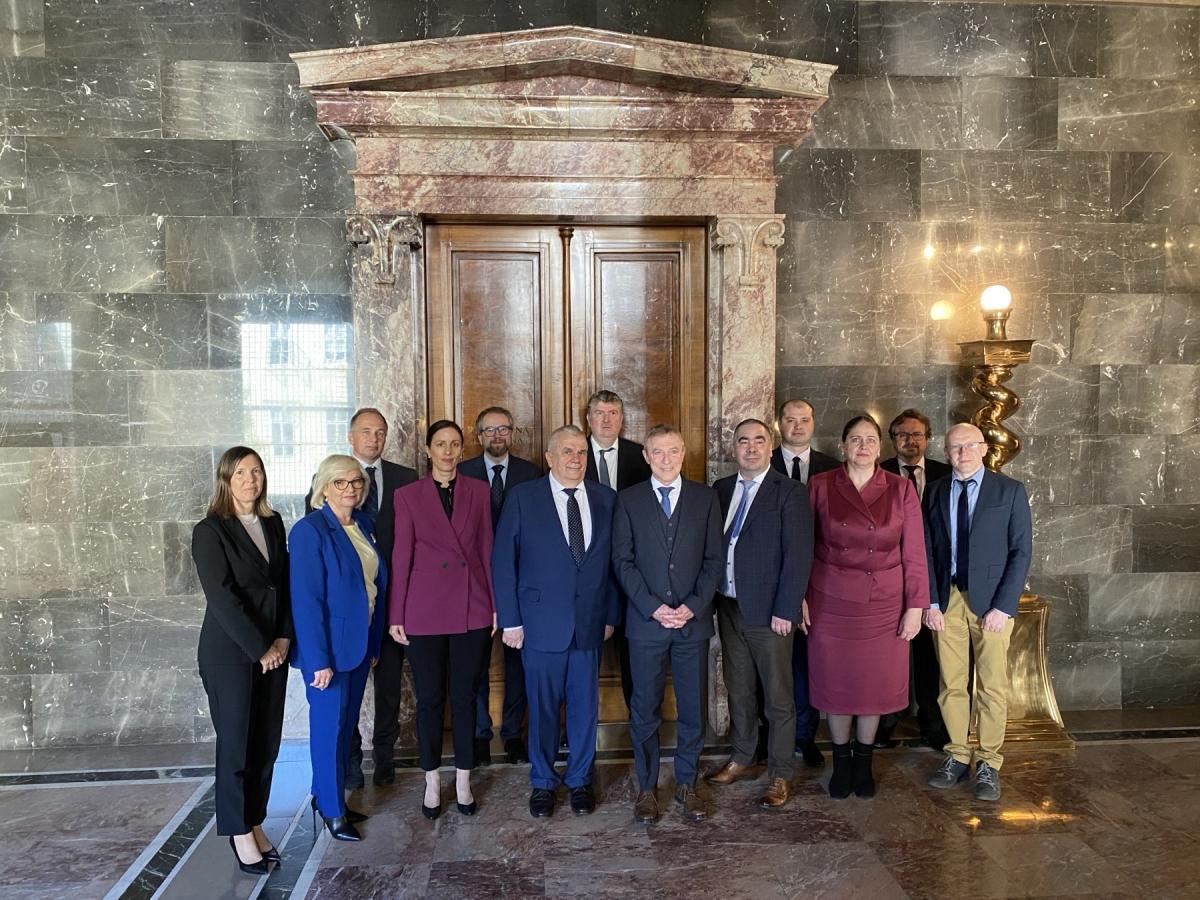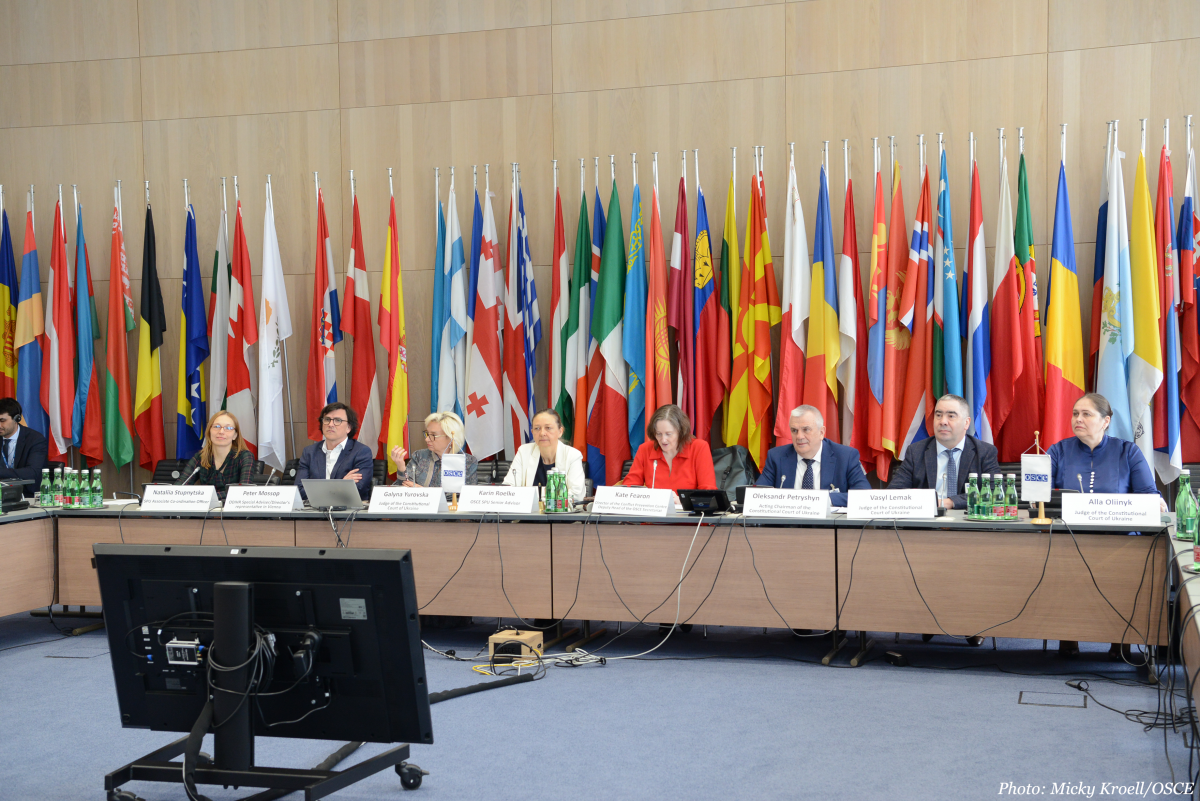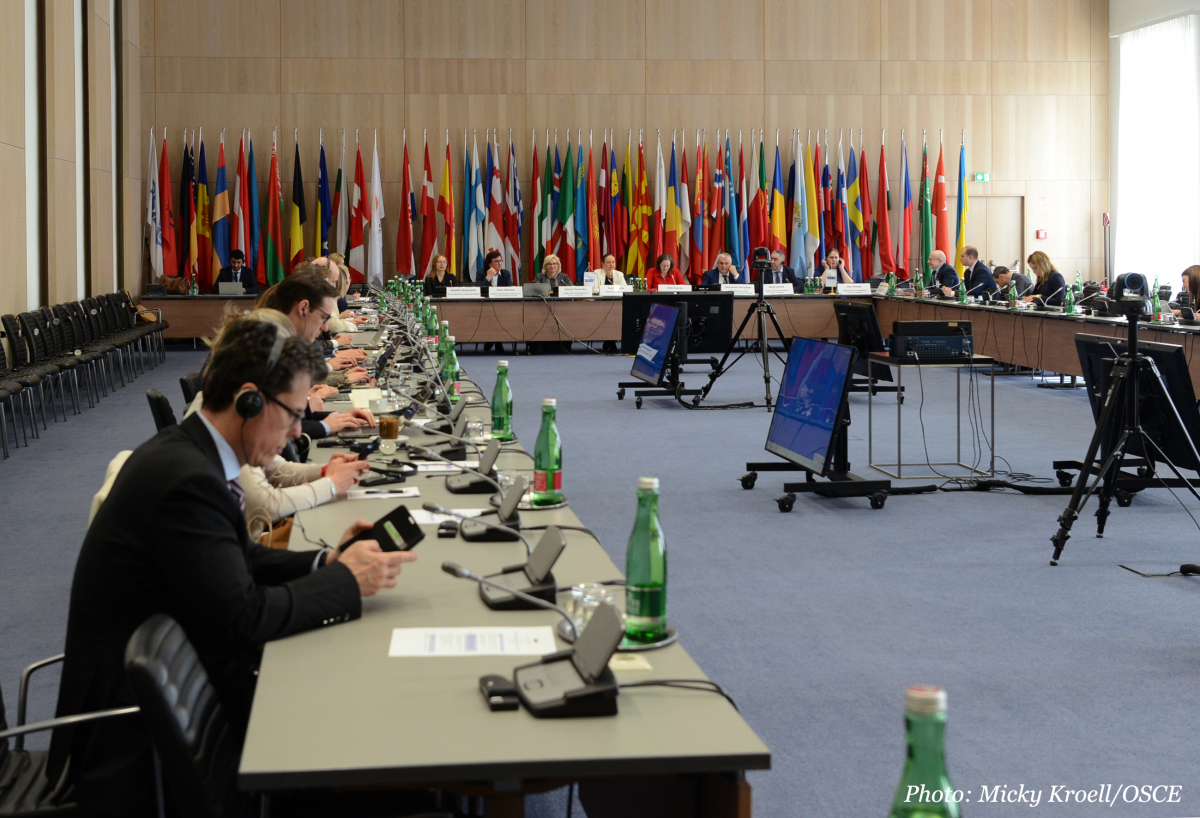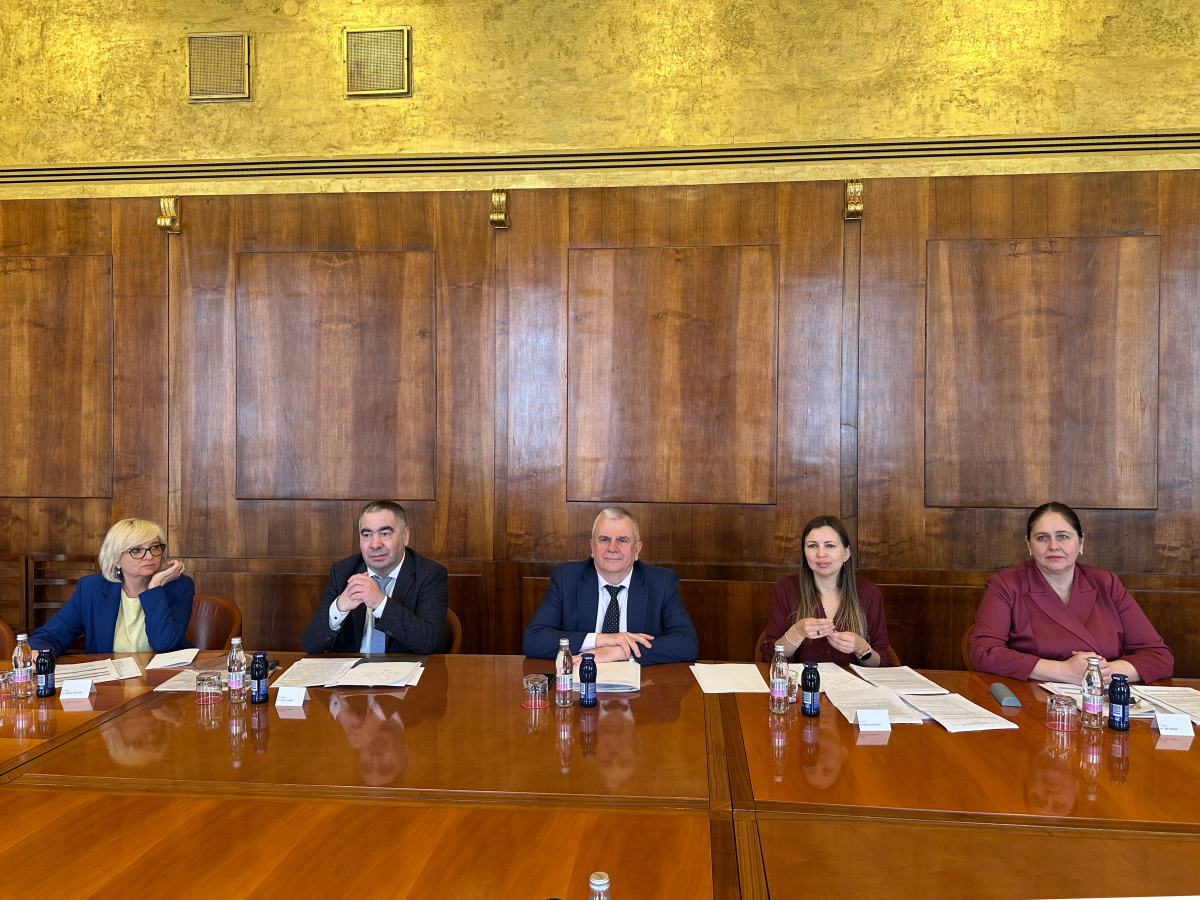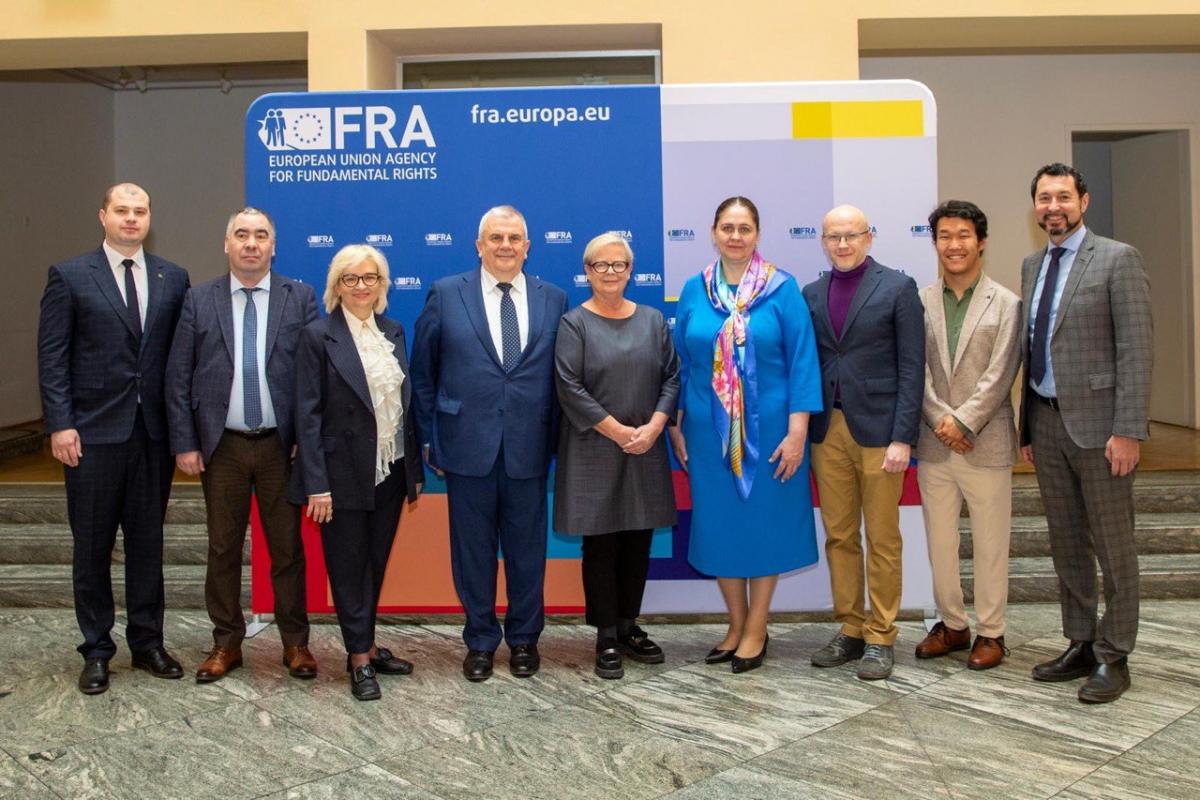CCU judges and representatives of European institutions discussed the role of constitutional justice in the face of challenges to democracy
15 April, 2025
A delegation of judges of the Constitutional Court of Ukraine (hereinafter, the “Court”) paid an official visit to European institutions - the Constitutional Court of the Republic of Slovenia, the Organisation for Security and Cooperation in Europe (OSCE) and the European Union Agency for Fundamental Rights (FRA). The purpose of the visit was to deepen international cooperation in the field of constitutional justice, exchange experience in protecting human rights in crisis situations, strengthen the role of constitutional review in the legal system of the state and harmonise practices with European standards. The delegation included Acting Chairman of the Court Oleksandr Petryshyn (head of the delegation), judges of the Court Vasyl Lemak, Alla Oliinyk, and Galyna Yurovska.
On 7 April, the participants were welcomed at the Constitutional Court of the Republic of Slovenia by the President of the Constitutional Court of the Republic of Slovenia Rok Čeferin and the Head of the Office of the President of the Court Katarina Ratoša. In his opening remarks, Rok Čeferin emphasised the importance of international cooperation between constitutional jurisdictions and the exchange of experience in the field of human rights and freedoms.
During this visit, Judge Galyna Yurovska delivered a presentation on Ukraine's experience in harmonising national legislation with European standards and the role of the Court in this process.
She noted that the preamble to the Constitution of Ukraine embodies the European identity of the Ukrainian people and the irreversibility of the state's strategic course towards membership in the European Union. In addition, according to Article 9 of the Constitution of Ukraine, the international treaties in force, ratified by the Verkhovna Rada of Ukraine, are part of the national legislation, which creates a proper legal basis for the application of the EU acquis in law enforcement practice.
The report also gave examples of the use of the EU founding treaties, regulations of the EU institutions - directives, regulations, judgments of the EU Court of Justice, general principles of law, as well as acts in the field of common foreign and security policy.
Judge Galyna Yurovska emphasised that the Constitutional Court of Ukraine actively applies the EU acquis as an important element of the country's European integration process. By taking into account the norms and principles of EU law in its decisions, the Court promotes the harmonisation of Ukrainian legislation with European standards of justice. This not only ensures effective protection of the rights and freedoms of citizens, but also strengthens the legal basis for Ukraine's future membership in the EU.
Matej Accetto, Judge of the Constitutional Court of the Republic of Slovenia, spoke about the application of the EU acquis communautaire by the Constitutional Court of the Republic of Slovenia. He analysed in detail the practice of implementing European law in the decisions of the national court.
Within the framework of the meeting, Acting Chairman of the Court Oleksandr Petryshyn delivered a report in which he analysed the peculiarities of the functioning of the institution of constitutional complaint, in particular, the current state and issues of normative constitutional complaint in Ukraine.
In his speech, Oleksandr Petryshyn referred to the origins of European models of constitutional review, as well as to the French model, which is non-judicial in nature. He emphasised that the Court was formed under the influence of both concepts, which was reflected in the formation of the national institution of constitutional complaint.
At the same time, according to Oleksandr Petryshyn, the current model of the complaint is limited and normative. It allows for appealing only against laws (or their individual provisions) that were applied in the final court decision in a person's case. This, on the one hand, provides a certain level of legal certainty, but on the other hand, does not always allow for effective protection of the violated right.
The speaker paid special attention to the need to improve the normative constitutional complaint, in particular, to expand its subject matter, to weaken procedural barriers, and to ensure a real possibility of restoring violated rights.
Neža Kogovšek Šalamon, Deputy President of the Constitutional Court of the Republic of Slovenia, delivered a presentation on the above topic.
Sebastian Nerad, Secretary General of the Constitutional Court of the Republic of Slovenia, spoke about the methodology of drafting the Constitutional Court's acts.
Judge of the Court Vasyl Lemak analysed the current challenges and directions of development of constitutional justice in times of war.
He noted that the Court is currently working in extremely difficult conditions, which are associated not only with a large-scale war, but also with organisational problems.
Vasyl Lemak emphasised that despite limited powers compared to some other European constitutional courts, in particular in terms of control over the hierarchy of regulations or compliance with international treaties, the Court continues to be active. In particular, in 2024, the Court delivered more than 500 reasoned decisions. Out of this number of acts, in 13 cases, the Court ruled on the constitutionality or unconstitutionality of acts, in most of which the Court declared the provisions of Ukrainian laws unconstitutional. The Court fulfils its primary role as a component and at the same time a guarantor of the mechanism of checks and balances in a democratic state, the judge noted.
Vasyl Lemak noted that since 2022, the beginning of Russia's large-scale aggression against Ukraine, the Court has delivered a number of very high-profile decisions - protection of the enhanced social status of military personnel, the status of religious organisations, a constitutional amendment on the immunity of MPs, special confiscation, protection of judicial guarantees of personal freedom, etc.
The judge emphasised the importance of methods of expanded interpretation of constitutional rights, in particular through the approach to the Constitution as a ‘living’ document that develops along with society. He stressed that constitutional proceedings should focus on cases of great public importance, and that the Court's case law should be based on a stable system of legal positions that form a binding doctrine. The judge emphasised that the Court's task is not only to exercise legal control, but also to preserve constitutional democracy, which is especially important in times of war.
On 9 April 2025, a delegation of the Court's judges held a meeting in Vienna with diplomats from donor countries of the OSCE Support Programme for Ukraine. During the event, titled “Democratic Resilience in Times of Crises: Constitutional Justice, War-Time Governance, and Ukraine’s Path to Recovery”, the participants discussed the results of the OSCE's ongoing project support to strengthen the constitutional justice system in Ukraine, key needs and areas for further support in the context of the ongoing crisis.
Acting Chairman of the Court Oleksandr Petryshyn presented a keynote speech on “Constitutional Justice in Ukraine’s War and Post-War Context”. He spoke in detail about how the Court has adapted to work in the context of war, outlined the main constitutional challenges faced by the country and ways to overcome them. Special attention was paid to the prospects of constitutional justice in the process of post-war recovery and integration of Ukraine into the European Union.
Oleksandr Petryshyn emphasised the key role of the Court in protecting the Constitution in times of war. Since the beginning of the full-scale invasion, he said, the Constitutional Court has delivered 40 decisions and more than 1600 court acts, which ensures the constant protection of the provisions and spirit of the Basic Law even in the most difficult times.
He paid special attention to the importance of the OSCE's support, which contributes to strengthening the Court's institutional capacity and implementing reforms in the field of human rights protection.
During the panel discussion “Rule of Law in Crisis – OSCE’s Support and the Road Ahead”, the Court's judges and representatives of the OSCE Support Programme for Ukraine discussed the role of constitutional courts during war and post-war reconstruction, the balance between security and democratic governance under martial law, and ways to increase the Court's transparency and inclusiveness.
Judge of the Court Vasyl Lemak outlined the role of the Constitutional Court of Ukraine in shaping the legal framework for post-war reconstruction.
Judge Alla Oliinyk addressed the issue of strengthening public confidence in the Court, noting that the main factor in this regard is the transparency of its activities and clear decisions.
During the discussions, Judge Galyna Yurovska outlined the Court's role in promoting gender equality within the constitutional justice system and noted that “a gender-sensitive Court is a fairer Court, and it is justice that every citizen expects.”
The event ended with a summary and discussion of further steps in cooperation between the OSCE and the Court to strengthen the rule of law in the country.
On April 10, 2025, representatives of the Court held a meeting with the Director of the European Union Agency for Fundamental Rights (FRA), Ms. Sirpa Rautio in Vienna. The event was an important step in establishing cooperation between the FRA and the Court, especially in the context of the ongoing challenges related to the war and the need to ensure respect for human rights.
In her welcoming remarks, Sirpa Rautio emphasised the importance of cooperation with the Court in the context of promoting rule of law standards and protecting fundamental rights. She also pointed out the importance of compliance with the EU Charter of Fundamental Rights, which is increasingly being taken into account in the case law of constitutional courts.
Participants discussed access to justice and criminal justice, in particular in the context of the European Arrest Warrant, as well as EU best practices for ensuring human rights in times of crisis. Particular attention was paid to judicial independence in a comparative perspective, taking into account the experience of EU member states.
A separate section of the meeting was devoted to FRA's training initiatives, including training for judges, joint manuals and newsletters. Possible areas of future cooperation were discussed, including the participation of Ukrainian judges in the Agency's trainings, exchange of practices, and expansion of analytical cooperation.

